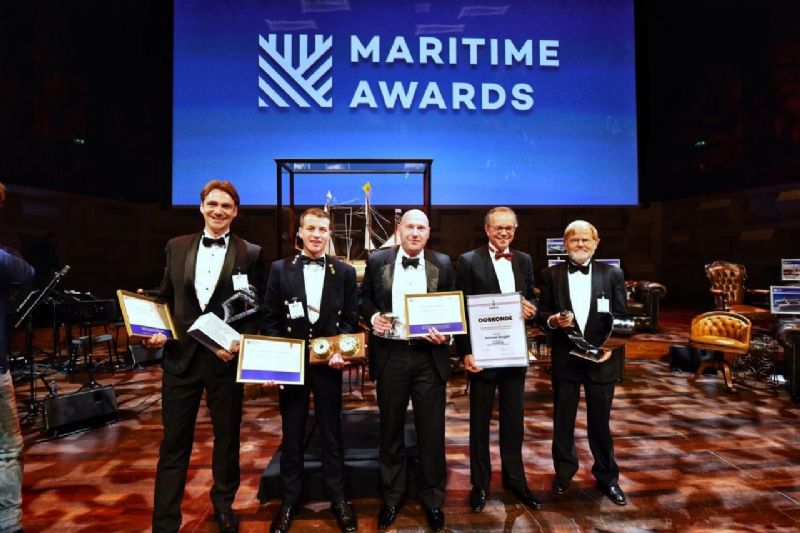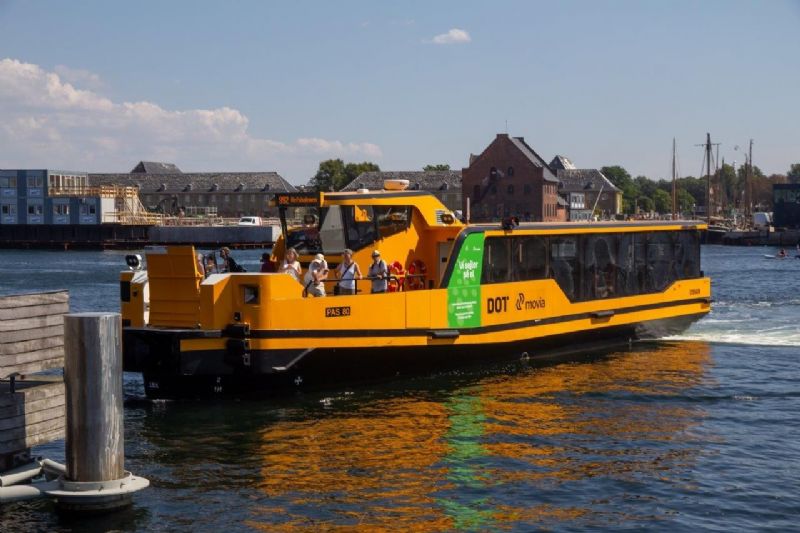
Dutch shipbuilders, suppliers and researchers develop a large number of practical and commercially viable products and methods
With 15 nominees for 5 Maritime Awards, the Dutch maritime sector is proving that it still has plenty of room for development and is still able to occupy a solid position in world trade. Each of the nominated products and R&D projects demonstrates the power of cooperation, R&D and high-quality production. From components for submarines and modular design methods to vaccination programmes and complete electric and autonomous vessels, two themes clearly stand out: innovation and sustainability.
It remains an impressive figure when you think about it: up to 90 per cent of everything that is transported is transported by sea. In other words: all the transport by trains, trucks and airplanes in the world adds up to only 10%.
World Trade
When container ship Ever Given blocked the Suez Canal in Egypt at the beginning of 2021, the importance of shipping to world trade was hard to underestimate. And it was no surprise that Dutch companies Boskalis, Smit Salvage and ALP Maritime were critical in refloating the ship, thereby restarting an important part of world shipping. The maritime sector not only consists of transport, of course. Other aspects include dredging, towage, fishing, offshore installation work and more. Dutch industry plays a role in all these fields, resulting in some EUR 30 billion in exports.
Standing still means going backwards
However, standing still is not an option. It inevitably leads to decline or crisis – just think of the 1980s when the Dutch shipbuilding industry seemed to be collapsing. Today, tough international competition (especially - but not only - from China) plays a role, as do defence and social interests. Opportunities are being explored for housing, food supply and power generation in or on the water, for example. And that has to be as sustainable as possible – the sector realises that.
Diesel
Running everything on diesel is no longer a viable option and so, various new services, products, methods and studies have been introduced in recent years. That these are paying off became clear on Monday evening during the presentation of the Maritime Awards 2021 in De Doelen in Rotterdam.
Five companies, researchers and designers were awarded prizes for special, practical innovations. In brief:
Maritime Innovation Award 2021: Demcon Unmanned Systems. For: new type of electric autonomous unmanned vessels
Maritime Designer Award 2021: Dr. Lex Keuning. For: additional cargo vessel propulsion using wind energy (by improving the Magnus Rotor system), delivering significant fuel savings
KVNR Award 2021: RIVM (Nils van der Kolk, project leader for hard-to-reach target groups). For:
COVID-19 Vaccination and certification programme for seafarers (first in the world)
RNLN Van Hengel-Spengler Award 2021: Lieutenant-at-Sea 3rd Class Noah Stam. For: research into options for ballistic missile interception and development of 3D simulation models
KNVTS Ship of the Year Award 2021: Damen Shipyards Group. For: electric ferry Bryggen for Arriva, Copenhagen
Content
Content
KNVTS Ship of the Year Award 2021 – Electric Ferry. 1
KVNR Award 2021 – Vaccination Program and Certification of Seafarers. 2
Maritime Designer Award 2021 – Wind-assisted propulsion of cargo ships. 3
RNLN Van Hengel-Spengler Award 2021 – 3D simulations regarding ballistic missile defense. 4
Maritime Innovation Award 2021 – Unmanned Autonomous Vessels. 5
Updated version: 2 Nov 2021
The Royal Dutch Association of Technicians in the Shipping Industry presents the prize to:
Damen Shipyards Group for: e-Ferry Bryggen
The Bryggen Ferry is an innovative design, fully electric, environmentally friendly, efficient to operate and economically viable and can carry 80 people. The ship's sustainable qualifications are achieved through a range of innovative digital shipbuilding techniques, including remote measurements, for which an on-board network of sensors is installed. This results in higher efficiency and a reduction in maintenance downtime.
The ship is completely emission-free due to the choice of electric propulsion with batteries as the energy source. No diesel generators are installed.
In addition, Damen developed an innovative mooring system: it is fully automatic to make the loading time as long as possible. The loading system is automatically linked to the shore power during docking.
In order to properly control and monitor the complex installation for sailing/unloading and mooring/loading, Damen developed a new control system, in which everything can be controlled and monitored from the bridge.
The ferry has a hull shape for the lowest possible water resistance. The bow is also ice-reinforced and equipped with a bow thruster for good maneuverability during windy conditions. The design ensures that Public Transport in Copenhagen, where customer Arriva will be using the ship, is making great strides towards a zero-emissions company.
Note that the other two nominations are also electric ferries:
https://youtu.be/-Q0y9ZYtpHw - e-Ferry for Amsterdam, the Netherlands
https://youtu.be/B39F0Q-KdVU - e-Ferry for Kiel, Germany
Royal Dutch Shipowners' Association presents the prize to:
RIVM, Nils van der Kolk, project leader for difficult-to-reach target groups, for: COVID-19 Vaccination Program for seafarers
The Netherlands was the first country to have an extensive vaccination program specifically designed for seafarers. In the spring of 2021, Nils van der Kolk (RIVM) led a project to vaccinate seafarers, a so-called 'hard to reach target group' that cannot participate in the regular national vaccination strategy.
Due to the international activities, the international character of the crew compositions on board the seagoing vessels and the limited time that seafarers spend in the Netherlands, customization was required.
That is why a vaccination program has been set up on the basis of which seafarers, regardless of nationality, were and are eligible for the one-shot vaccine 'Janssen'. This has helped many seafarers continue to do their jobs safely and companies to be of value to their crews in uncertain times.
The award is presented on behalf of the industry to:
dr. ir. Lex Keuning for: Improved aerodynamic performance Magnus Rotor for Sail Assist
The application of auxiliary sailing power for the (auxiliary) propulsion of cargo ships is booming. One of the systems currently in use is the Magnus Rotor. This system is known for its simplicity, ease of operation, high lift (lifting force), reliability and ease of operation.
These are vertical cylinders that are placed on a ship. By spinning they give the ship extra thrust (essentially the same effect as a curve-ball in soccer or tennis), because the combination of the ship's own speed and the actual wind creates an 'apparent wind' (ie the wind that one feels on board). See how this principle works here: Rotor Sail Explained - YouTube.
Lex Keuning's idea (an extra 'flap') increases the efficiency of the conventional rotor. In a collaborative project between Delft Technical University (Dept. of Maritime Technology) and the Polytechnic University of Milan, Keuning's adaptation was proven to be significantly more efficient than that of the conventional rotor.
The Royal Netherlands Navy presents the prize to: Lieutenant Commander 3rd Class Noah Tribe for: Parameters Determining Intercept Capabilities - SM-3 vs Various Threat Ranges
Noah Stam conducted his BSc. graduation research at the NLDA on the subject of 'Ballistic Missile Defence'. He specifically focused on the feasibility of intercepting intercontinental ballistic missiles from a naval vessel.
To protect equipment and personnel against conventional and nuclear ballistic threats, Ballistic Missile Defense (BMD) is essential. Interceptor missiles are used for this and this is also tested in practice.
Stam developed 3D simulation models with which the practical tests can be accurately simulated. With the help of the simulation models, the Royal Netherlands Navy is able to use and further develop its Ballistic Missile Defense capacity in a smarter way. The resulting paper currently provides a framework for further research into optimizing NATO's BMD capabilities.
The award is presented on behalf of the industry to: Demcon Unmanned Systems for: Unmanned autonomous vessels with new positioning system
The growing demand for safe, unmanned, sustainable and remotely controlled operations on the water parallels the increasing need for digitization and automation.
Demcon Unmanned Systems is responding to this by developing and manufacturing unmanned autonomous vessels (USVs) for inspection, monitoring and maintenance applications in shallow, inland and offshore waters.
These technologies make it possible to increase deployability and automate processes while minimizing environmental impact, without sacrificing functionality and quality.
Demcon developed a new, patented positioning system for accurate, reliable and durable control of USVs. Based on standardized system architecture and platform design, the ship design can be modified and scaled in size, power and thrust. This makes this technology widely applicable and allows the integration of many different equipment – ??in fact custom-made USVs.
What is special is that the system (‘a fixed thruster configuration’) makes it possible to move in all directions without moving control parts, such as rudders or turntable thruster pods. This allows USVs to maneuver very accurately. In addition, Demcon has developed an 'unsinkable' hull shape and the new USVs are low-maintenance, quiet and durable (due to the absence of gears, lubricants, fluids and an emission-free system, among other things).


We use cookies to improve your experience. By continuing to use our site, you accept our Cookies, Privacy Policy,Terms and Conditions. Close X